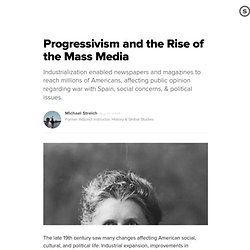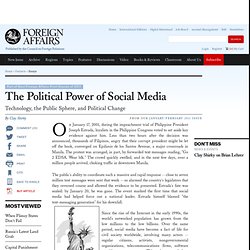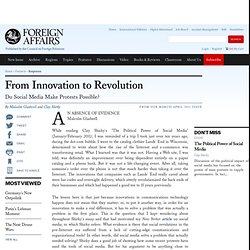

Médias et opinion publique dans les grandes crises politiques depuis l'affaire Dreyfus. Histoire Tle ES L. Progressivism and the Rise of the Mass Media: Newspapers and Magazines Helped Shape American Public Opinion. The late 19th century saw many changes affecting American social, cultural, and political life.

Industrial expansion, improvements in transportation and communication, and growing consumerism helped to shape middle class values and, most importantly, how Americans thought. In this, the role of the emerging mass media cannot be understated. For good and for ill, newspapers and magazines helped drive Americans to war, demand safer urban environments, and give teeth to the Progressive Movement of the early 20th century.T he Changing Role of Newspapers Newspapers had always existed, beginning in the Colonial period.
The value of newspapers wasn’t lost on Abraham Lincoln, who purchased German newspaper publishers in order to sway an important voting immigrant block in the 1860 election. Industrialization had made printing more efficient, allowing papers to reach more people at a much lower production cost. Yellow Journalism and the Spanish-American War Magazines and Muckrakers Sources: What Drives Public Opinion About Climate Change? Watch The Full Program. They spend their days sifting through reams of market research data.

They conduct endless surveys and focus groups. They comb the streets, the schools, and the malls, hot on the trail of the "next big thing" that will snare the attention of their prey--a market segment worth an estimated $150 billion a year. They are the merchants of cool: creators and sellers of popular culture who have made teenagers the hottest consumer demographic in America. But are they simply reflecting teen desires or have they begun to manufacture those desires in a bid to secure this lucrative market? And have they gone too far in their attempts to reach the hearts--and wallets--of America's youth? FRONTLINE correspondent Douglas Rushkoff examines the tactics, techniques, and cultural ramifications of these marketing moguls in "The Merchants of Cool. " Teenagers are the hottest consumer demographic in America.
But marketing to teens isn't as easy as it sounds. Take MTV. But also very lucrative. Do we shape media, or does media shape us? A Sports Case Study. As a big sports fan, last week I saw a video that had me thinking of boycotting baseball for awhile.

Young baseball star, Bryce Harper, who signed with the Washington Nationals as an 18 year old prodigy, certainly lived up to his "rockstar" persona. After hitting a homerun in a minor league game, Harper not only stood at home plate and admired his hit for a few seconds, but then proceeded to blow a kiss to the pitcher. Completely inapprorpiate, unsportsman-like conduct. The video went viral immediately. (You can watch the shame fest here: While at first I wanted to punch Harper through the TV screen, I started to think: did the media turn him into this pompous athlete? Over a year ago I remember hearing about Harper for the first time. Then the media - and social media - storm hit. How can a 17-year old who has never proved anything have such a legendary status in the sports media world?
Why do we see so many athletes today "working it" for the crowd? Democracy In America Home. The Political Power of Social Media. On January 17, 2001, during the impeachment trial of Philippine President Joseph Estrada, loyalists in the Philippine Congress voted to set aside key evidence against him.

Less than two hours after the decision was announced, thousands of Filipinos, angry that their corrupt president might be let off the hook, converged on Epifanio de los Santos Avenue, a major crossroads in Manila. The protest was arranged, in part, by forwarded text messages reading, "Go 2 EDSA. Wear blk. " The crowd quickly swelled, and in the next few days, over a million people arrived, choking traffic in downtown Manila. The public's ability to coordinate such a massive and rapid response -- close to seven million text messages were sent that week -- so alarmed the country's legislators that they reversed course and allowed the evidence to be presented.
From Innovation to Revolution. AN ABSENCE OF EVIDENCEMalcolm Gladwell While reading Clay Shirky's "The Political Power of Social Media" (January/February 2011), I was reminded of a trip I took just over ten years ago, during the dot-com bubble.

I went to the catalog clothier Lands' End in Wisconsin, determined to write about how the rise of the Internet and e-commerce was transforming retail. What I learned was that it was not. Having a Web site, I was told, was definitely an improvement over being dependent entirely on a paper catalog and a phone bank.
But it was not a life-changing event. The lesson here is that just because innovations in communications technology happen does not mean that they matter; or, to put it another way, in order for an innovation to make a real difference, it has to solve a problem that was actually a problem in the first place. MALCOLM GLADWELL is a Staff Writer for The New Yorker. To continue reading, please log in. Don't have an account? Register Register for free to continue reading.